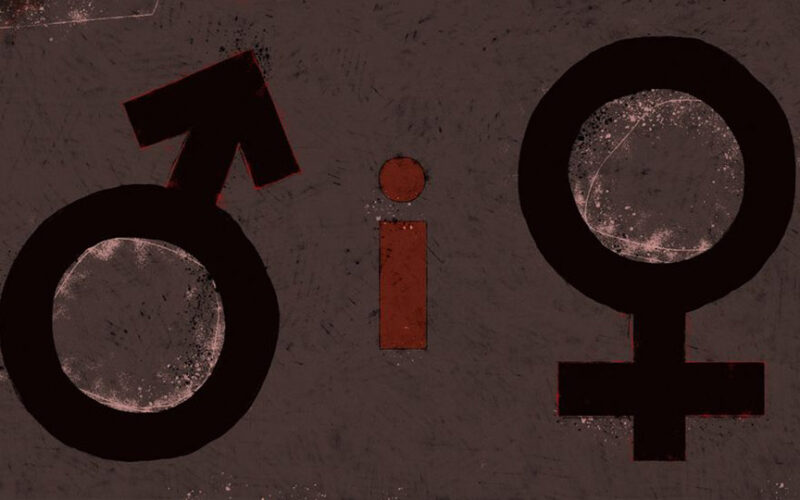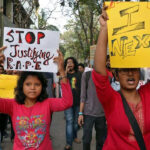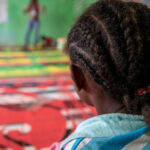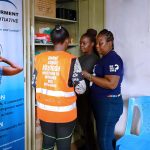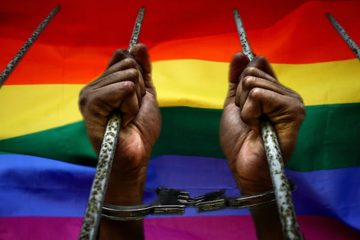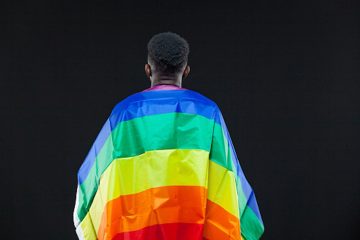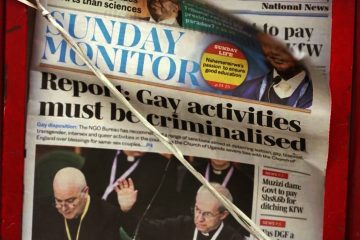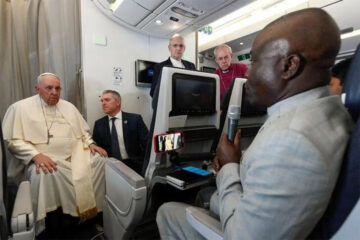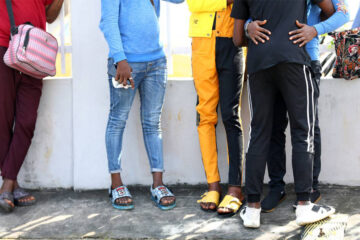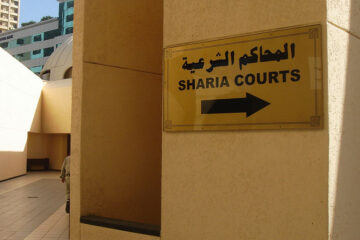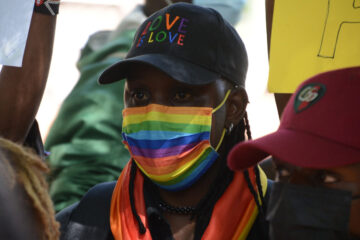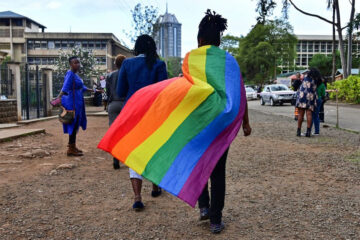NDUTA WAWERU
UNTIL he was ten years old, Sidney Etemesi (not his real name) thought he was a girl.
“I was born and raised a girl in Kakamega County,” Etemesi stated, speaking in Nairobi.
“My parents named me Beatrice and made sure I lived as a girl.”
There was no room for any gender ambiguity – or discussion – at home in Kakamega, as Etemesi was to find out.
“You were either a boy or a girl and acted like one. I was different, and I knew something was wrong,” Etemesi explained.
At ten years old, in primary school, while using the toilets, a girl asked Etemesi (who was still identifying as a female) to hold the door for her because it was broken.
“When she squatted to pee, I knew she was different from me, and I was concerned,” Etemesi said.
“When I went home, I started asking my mother questions, but every question was followed by anger, silence, and even beatings. I was devastated, but I knew there was more to it,” he added.
Etemesi said that although he was raised as a girl, he was essentially intersex – a general term used for various situations in which a person is born with reproductive or sexual anatomy that doesn’t fit the boxes of “female” or “male.” It is estimated that between 1.7 and 3.0 percent of the global population is intersex. Etemesi was male presenting and found that he identified as male, too. He hated wearing dresses and skirts and spent time in trousers.
“When my dad, who was living in Nairobi at the time, retired and came home to Kakamega, things changed. He banned girls in his household from wearing trousers.”
One day, Etemesi came home from school only to find out that his father had burnt all his trousers and shorts. The situation devastated him so much that he contemplated suicide.
But these were just the first of the trials he would face.
At puberty, Etemesi was attracted to girls and even started flirting with them. It led to chaos.
“Parents and the elders were constant visitors at our house to complain to my parents that I am a lesbian and I am trying to hook up with their daughters,” he said.
What followed was constant physical and verbal abuse. Then one day, his father had had enough and took drastic measures.
He tricked Sidney into going with him to the local administration office and registered him as an adult, even though he was only 13.
Although Sidney was born in 1990, his identity card now shows his year of birth as 1985. It was not a mistake. His father had had enough of Sidney and his ‘shenanigans’,
“When I finished with the registration, my father told me he wanted nothing to do with me. He said I was bringing shame to the family, and as a respected and wealthy person in the village, he could not stand for it.”
Kicked out of the only home he had known and with nowhere to go, the thirteen-year-old tried sneaking back into his father’s compound and sleeping where there was space. To dissuade him, his father would send village boys to beat him up and eventually, to kill him.
“I knew one of the boys in the gang hired by my father. One day he came to me and told me not to sleep in the kitchen that night because they were coming for me and had been sent to end my life. I knew I had to leave Kakamega,” Etemesi explained.
Without a cent in his pocket, Etemesi stole some money from his mother and boarded the bus to Nairobi. He thought he was heading to the “green city in the sun”, as Nairobi advertised itself – and that he remembered from visits as a child – but he arrived to a concrete jungle. With no one to support him, he lived on the streets as a homeless person, for three years.
One day, while begging money from motorists, he got chatting with a young woman in an uber.
“She asked me what had brought me to the streets, and I told her my life story,” Etemesi recalls.
“She asked me if I could do any work, and when I said yes, she took me to a safe house.”
It later transpired that the woman he had spoken with was transgender.
“That’s how I left the streets and started [a new] life.”
That was back in 2004, but it took Etemesi many more years to come to terms with his status. In 2016, he finally identified as an intersex person.
Etemesi faced other battles throughout this journey, including stigma, violence from the community, and mental health issues such as depression.
“I have ambiguous genitalia, with active male and inactive female organs. Although I am male-presenting, I still get periods,” Etemesi says.
“They’ve been painful and irregular all my life. There are days I get periods continuously for three months and then nothing for three years, and this frustrates me,” he continued.
Etemesi recently started medication to manage the periods and is still considering surgery to remove ovaries and the tiny uterus in his body. He also had to make peace with the fact that his relationship with his family will always be strained and that his father passed on without accepting his reality. However, Etemisi does have the choice to present as the gender he chooses to be.
Unnecessary surgeries
Sharon Ngure, 26, wasn’t given that opportunity. At birth, when his/her parents realised their child was intersex, they asked the doctors to operate to make him/her more female, as they had wanted a girl.
His/her life as Sharon was filled with surgeries.
“I had at least eight surgeries from birth to around 11 or 12 years. I did not understand what these operations were for, and neither did I have someone to ask,” he/she explained.
Along with the surgeries was hormonal medication he/she had to take to look more feminine. With the drugs, he/she developed breasts and wider hips and a smooth voice – but some features considered masculine still presented, too.
“I remember when I was in class six, my beard started growing. The children in school used to refer to me as a boy-girl, because of my physical attributes,” Ngure recalls.
“I had to carry a razor blade to nick off any strand of facial hair the moment it grew to avoid scrutiny and questions,” he/she explained.
Ngure has faced many similar moments because he/she still goes by the name Sharon, even after dropping the hormonal medication and becoming more masculine looking. Ngure’s beard has grown, and the breasts and hips that were maintained by the drugs are now gone. His/her voice has also broken.
“The problem with that is people think you are an impersonator. They not only attack you but also strip you to find out who you are. Others seduce you and sleep with you in the quest to find out whether you are male or female, then go spread the word around,” Ngure explains.
The same goes for his/her official documents.
“I have had medical officers tell me they cannot give me my hospital documents because my situation is special. It has taken a lot of work for me to get… my hospital records,” Ngure narrated.
Important Strides
Both Ngure and Etemesi are now able to find support thanks to organizations such as Jinsiangu (which means “my gender” in Kiswahili), which are working to support intersex people in Kenya. However, building organisational support has required a concerted effort.
Jinsiangu creates safe spaces for the existence of transgender, gender non-conforming, and intersex persons in the country. The objective is to normalize their lives and presence. Ava Mrima, the organisation’s communication officer, said the journey had been filled with difficulty and unnecessary obstacles.
“We are addressing some of the structural issues that plague intersex persons in the country. Most of them are exposed to intersex genital mutilation at birth due to ignorance on both the parents and doctors’ side and lack of a framework for medically treating intersex conditions,” Mrima explained.
According to the Kenya National Commission on Human Rights (KNCHR), medical personnel and parents often assign intersex newborns as either male or female for the purposes of birth registration and social life.
However, in some cases, the babies are subjected to corrective surgery, which involves removing the whole or part of the child’s reproductive organs so that they can match the sex assigned at birth.
Mrima added that the organisation advocates the abolishment of such surgeries, by creating awareness amongst midwives, local area chiefs, doctors, and local communities of the harm of such practices. They explain the benefits of avoiding intersex-related surgical procedures until a child is old enough to understand themselves as an intersex person and choose surgery if they want it.
“Because most people do not understand what intersex is all about, intersex people face a lot of violence. They are assaulted, stripped, and even locked up because of the shame associated with their condition,” Mrima explained.
Such a situation results in other problems, such as a lack of education, which makes intersex people unable to sustain or generate income either as an employee or an entrepreneur.
“Our capacity-building pillar seeks to change that. We train and empower intersex people to transition into a space where they can be self-sustaining. We also empower their parents, most of whom are economically disadvantaged, with various programmes, including paying tuition fees for their intersex children,” Ava added.
The sensitization work by organizations such as Jinsiangu has started bearing fruit. In 2019, Kenya became the first country in Africa to include intersex in the census.
“It was something we have been waiting for,” said Etemesi. “When that happened, I felt, ‘now my voice is being heard.”
The census was the result of work by the Taskforce on Policy, Legal, Institutional and Administrative Reforms regarding Intersex Persons in Kenya, which had been constituted by the country’s attorney general to investigate and make recommendations aimed at addressing the plight of intersex persons in Kenya.
Recommendations included recognition and documentation, including changing sex markers, and protection of the dignity of intersex people in the criminal justice system.
It also called for the formulation of health programmes targeted at intersex people, funding to facilitate the same and sensitisation of the community- including within school programmes – on intersex conditions to combat the
stigma and violence they face. Collection of data and provision of social-economic services were also recommended.
While inclusion in the census was a step in the right direction, the process was not all smooth.
“I was counted as male,” said Etemesi, “The enumerator who came to my house marked me as male. They did not even ask me how I identify; they were more focused on other parts of the census.”
Other reasons many intersex people were not counted, Etemesi explained, include fear of outing themselves due to the stigma and violence they may face with such revelation.
“This was the perfect opportunity for the government to include intersex people as enumerators because they would have been more sensitive to that question as compared to others, some of whom have never heard of intersex,” Etemesi added.
Ngure also said he/she was not counted as intersex because he/she knew the enumerator and was afraid they would spread the word about him/her. Since Ngure stays in the village, the risk of ridicule and stripping attempts would have been high.
“The inclusion in the census made me feel good. It indicated that the government had already started to recognise the intersex. I hope this recognition will get to the level where the intersex will be considered the third gender, and we will receive support in terms of funding and opportunities to advance ourselves,” he/she said.
Already progress is becoming visible with the appointment of an intersex person to the country’s human rights commission, Dennis Nyongesa Wamalwa, and the candidature of an intersex person – Kwamboka Kibagendi, who is also the intersex programs coordinator at Jinsiangu – to be a member of a county assembly.
All this, those interviewed said, solidifies the message, ‘We exist.’
“Being intersex is not something one can choose. We were created this way,” said Ngure.
“They are not a curse or a result of witchcraft. They are ordinary Kenyans and deserve an opportunity to experience citizenship without barriers to life,” said Mrima.
Etemesi agrees.
“Intersex people are human beings,” he said. “We were created by God.”
[This story was provided to bird by Storify, an agency under Africa No Filter]

